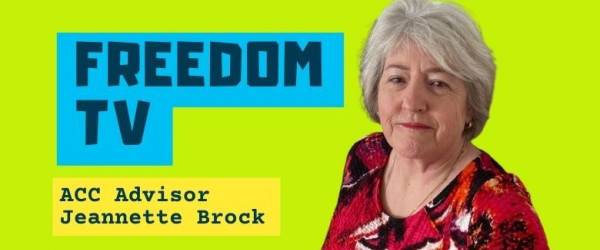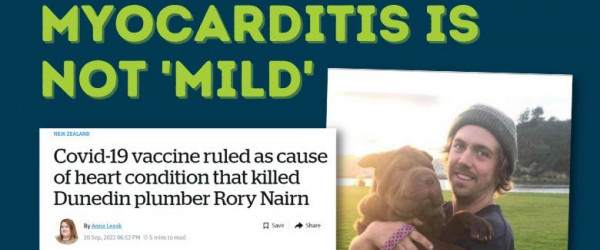
Jeannette Brock: ACC Advice For The Vax Injured
How to progress your Treatment Injury Claim and What to do if the claim is declined
Advice from ACC Advisor, Jeannette Brock.
- If you suspect that you have suffered a treatment injury because of the vaccine it is your right to lodge the claim with your GP or your local hospital. Treatment injuries are covered under the 2001 ACC Act, sections 32 and 33. It is highly recommended that you lodge a treatment injury claim as soon as possible, because this may affect whether or not ACC accept the claim. (Usually, most of us suffer for a few days before we trot off to our GPs or if your symptoms are severe in the ring for an ambulance or get to your A&E).
- Sometimes treatment injuries are not always evident within the first few days of receiving the treatment, sometimes it can take months for a person to start suffering symptoms of an unusual nature. This will not prejudice your claim, you have a year or even longer for treatment injuries to be lodged.
- I recommend if you are starting to suffer symptoms early on, that you record all the symptoms that you experiencing even if you don’t think they are relevant. It’s really important to record a before and after account of your symptoms.
- Once you have logged your claim with your GP or the hospital, the claim will be sent to ACC to their Treatment Injury Department. Unless your injury is one that is also recognised and accepted as being part of a vaccine injury, ACC will probably accept the claim, after they have carried out an initial investigation.
- If you present with unusual symptoms, such as an autoimmune disorder, nerve damage, severe headaches just to name a few ACC does and can take up to 9 months to investigate your claim. If it’s not possible that you can work at this time you will need to go on an Invalids Benefit.
- For ACC to actually accept the claim you actually have to have suffered a personal injury, such as an infection at the wound site or other diagnosed conditions. The criteria for excepting your claim are defined by the legislation (there must be evidence of physical harm or damage to the patient. Symptoms alone are insufficient to amount to a physical injury, common physical injuries in regards to vaccines include wounds arising from tissue damage, infections, anaphylactic reactions, strokes, Bell Palsy, and many more.
- Once you have lodged your claim and if it is accepted, you can apply for reimbursement of all treatment costs covered by ACC, you may also be entitled to weekly compensation if you were earner at the time the treatment injury occurred, if you are incapacitated for longer than two weeks you can certainly apply for weekly compensation and you would get 80% of your normal income or if you are self- employed you would receive 80% of your previous year’s earnings. After a period of time once your injury settles and if it is permanent, you may also be entitled to apply for a lump-sum, an assessment would be carried out by one of ACC’s lump-sum assessors. You would also be entitled to any prescriptions that you have paid for that are not covered by the health system; these do not include alternative medicines. You would also be entitled to travel allowances to your treatment providers and meetings with ACC. For any other assistance you would need to contact your case manager or ACC directly.
- If the unfortunate thing happens with your partner, family member dies as a consequence of the vaccine, and the claim is accepted then the partner is entitled to funeral costs, and a small lump sum paid to the partner at that time, again if the deceased was working at the time of death, the partner would be entitled to weekly compensation of 60% of those earnings for up to 5 years, there are conditions around these payments that you will need to be fully informed about. ACC do not pay out on lump-sum on the death of your partner.
- Declined claims – If the unfortunate thing happens that your claim is declined then you are entitled for that decision to be reviewed, you have three months from the time of the decision to lodge your dispute, ACC have the applications which are very easy to fill out and send back into them. Once the dispute has been received by ACC then they have three months to set down a review hearing date, for you to be successful at a review hearing, you need medical evidence to support your claim. Which would include getting and providing all your medical records from your GP or Hospital or both, you also need to ask ACC to provide all the medical history/analysis as to the reasons why they turned down your claim, (ACC have 21 days to comply). Once a review hearing is set down, an independent reviewer will be assigned to hear your dispute. Before you go to a review hearing, there is an opportunity to attend mediation first which is less informal and the mediator can make recommendations on your behalf. This will also give you an opportunity to obtain a greater understanding as to why ACC turned down the claim initially, and it may be in fact that you don’t have evidence of a physical injury (diagnosed condition). Or you find out that ACC have done very little investigation. One of the things that you can ask for at mediation, is for ACC to cover the cost of getting a further medical opinion from an expert such as, urologist, neurologist, cardiologist, musculoskeletal specialist, et cetera to confirm the diagnosis. If ACC refuse to cover these costs, then you will have to pay for them yourself, but once you have the review hearing and a decision is issued either to be dismissed or quashed in your favour, these costs will be reimbursed back to you.
- If you are successful at review, any weekly compensation that is owing to you will be backdated, you will also be entitled to recover your treatment costs and travelling allowances.
- Finally, there are advocates and lawyers who will take over your claim and represent you at a review hearing, if your claim is really complex, I was suggest that you employ a review specialist, especially if your injury is permanent.
The 2001 ACC legislation covering these points:
Section 6: Interpretation
Section 20: Cover for a personal injury suffered in New Zealand
Section 25: Accident
Section 26: Personal Injury
Section 32: Treatment Injury
Section 38: Date on which person is to be regarded as suffering treatment Injury
Disputes:
Section 134: Who may apply for a review
Entitlements:
Section 3: The Purpose
Section 67: Entitlements and related matters
Schedule 1 Part 2: Weekly compensation
Schedule 1 Part 3: Lump Sum compensation for Permanent Impairment
Part 4: Entitlements arising from fatal injuries
Download a copy of this document
Download a copy of the ACC Code Reference List
Thanks for reading and sharing! Remember to sign up to our mailing list to keep up with the latest news.
If you value what we are up to at Voices and would like to support our ongoing work you can donate to us and support our nationwide public education campaigns (webinars, flyers, billboards...) and other initiatives to speak up and push back for your freedoms.



